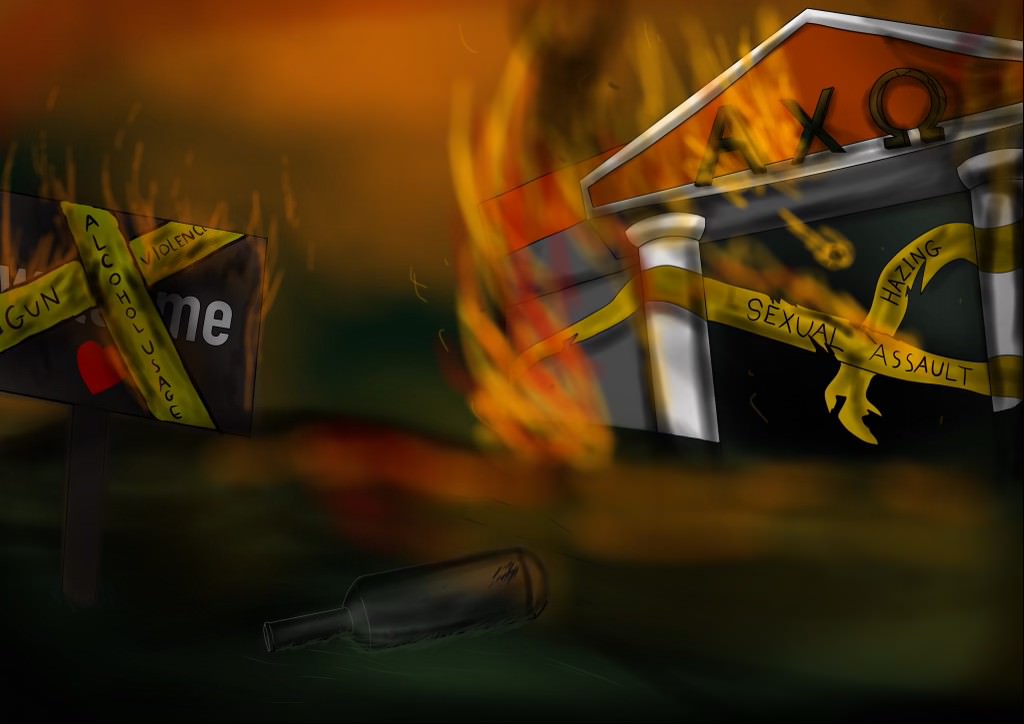Greek life is seen as an instrumental aspect of the “full college experience.” Dating back to its establishment in 1825, some students even dictate their college decisions based on the quality of the fraternities and sororities over the university’s academic recognition. Attending rush week activities smiling ear to ear, like bid day, many hopeful new members to Greek life on campus are blind to the culture they will be exposed to throughout college. Behind the scenes, despite the repeated reports over the past few decades, universities have been blatantly ignoring the extreme levels of hazing and sexual assault — and they’ve been getting away with it.
While joining Greek life offers students a sense of belonging and community, the toxic environment and “frat boy” stereotype has become accepted by society rather than attempting to change the culture. Specifically, certain fraternities have gained reputations for excessive hazing and sexual assault. After rushing season, girls are often warned of notorious fraternities. Lizzie Miller (‘24) who currently attends the University of Alabama and is a member of Alpha Phi, appreciates the sense of community the sorority offers. But, Miller was also warned about a fraternity on campus by members of her sorority.
“I was warned about Pi Kappa Alpha because they’re known as ‘Pike spike,’” Miller said.
While Pi Kappa Alpha at the University of Alabama is known for spiking drinks, other fraternities like Sigma Alpha Epsilon across the nation are also notoriously known as “sexual assault expected.”
Delaney Ballard (‘23) attends the University of Colorado, Boulder and is a member of Gamma Phi Beta. Ballard agrees with the fact that fraternities are not properly regulated, as “there’s a lot of stuff that goes under the table and it gets talked about, but nothing really happens.”
According to Our Wave: A safe harbor for survivors of sexual harm, “Research has found that fraternity men are three times more likely to sexually assault a woman than non-affiliated classmates. Additionally, for women in sororities, it was reported that they are 74% are more likely to be raped than other college women.”
The film “The Hunting Ground” depicts two former female University of North Carolina at Chapel Hill students and their struggles with the university’s response after filing a Title IX complaint following sexual assault. The documentary was filmed in an attempt, “to help champion conversations about sexual assault on college campuses around the country.” The university’s lack of response to sexual assault reports is still extremely prevalent today, despite some minimal measures universities have taken.
An article from Rolling Stone ranked the top 10 “Most Out-of-Control Fraternities in America.” The list involved drug scandals, excessive alcohol consumption, force feeding, trading nude images, sharing hazing techniques, gun violence, sexist comments, rape, damaging property, racism, death — the list goes on.
Certain traditions within fraternities makes it even more challenging for “the brotherhood” to part from its old ways. Most notably, at Pennsylvania State University a ritual from Beta Theta Phi called the “gauntlet” — an involuntary excessive drinking game — led to the death of Timothy Piazza. Eight students were charged with involuntary manslaughter and the other 10 with “hazing and furnishing alcohol to minors.” Another tradition at Louisiana State University from Phi Delta Theta called the “bible study” — another involuntary excessive drinking game, in which pledges were quizzed — led to the death of Max Gruver.
But Piazza and Gruver are not the only ones. According to BestColleges.com, “It’s estimated that since 2000, 105 college students have died from hazing-related incidents.” But why did it take a death and a court case for the university to take action? Piazzas’ death led to Penn State adopting new policies and the permanent ban of Beta Theta Phi on campus. While it was one step in the right direction, on the national level, universities are still struggling to protect their students from the fraternities’ trends, with a lack of regulations and laws in place.
According to USA Today, “forty-four states and the District of Columbia have anti-hazing laws in place, but definitions of hazing vary. Laws in at least 15 states do not include the consent clause, which asserts that an individual’s willingness to participate in potentially hazardous actions does not protect those involved from hazing charges.”
With this being said, it is understandable that not all sorority and fraternities across the nation are facing issues to the extent of death and lawsuits. For instance, Miller feels that at the University of Alabama, all students have resources and open discussions, if necessary.
“They talk about sexual assault a lot and they have resources for it,” Miller said.
Ballard feels similar in a sense that the University of Colorado, Boulder provides them with educational resources and how to protect themselves, but there is definitely still a need to be aware and cautious.
“I feel safe going out to anything with my sorority,” Ballard said. “You have to be a little bit more careful, but there are definitely certain fraternities that I totally feel safe with and there’s some that I definitely feel like I have to be more cautious.”
But while a few colleges and fraternities may stand out as an exception, the question remains: when is enough, enough? It is imperative that laws and regulations must be implemented from a national standpoint, ensuring that students attending all universities have the fundamental right to feel safe and cared for on campus. Institutions need to hold themselves accountable and prioritize the well-being of their students in Greek life and foster a culture that does not tolerate violence and hazing.









